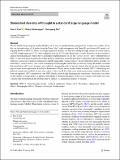Diminished diversity-of-thought in a standard large language model
Author(s)
Park, Peter S.; Schoenegger, Philipp; Zhu, Chongyang
Download13428_2023_Article_2307.pdf (1.085Mb)
Publisher with Creative Commons License
Publisher with Creative Commons License
Creative Commons Attribution
Terms of use
Metadata
Show full item recordAbstract
We test whether large language models (LLMs) can be used to simulate human participants in social-science studies. To do this, we ran replications of 14 studies from the Many Labs 2 replication project with OpenAI’s text-davinci-003 model, colloquially known as GPT-3.5. Based on our pre-registered analyses, we find that among the eight studies we could analyse, our GPT sample replicated 37.5% of the original results and 37.5% of the Many Labs 2 results. However, we were unable to analyse the remaining six studies due to an unexpected phenomenon we call the “correct answer” effect. Different runs of GPT-3.5 answered nuanced questions probing political orientation, economic preference, judgement, and moral philosophy with zero or near-zero variation in responses: with the supposedly “correct answer.” In one exploratory follow-up study, we found that a “correct answer” was robust to changing the demographic details that precede the prompt. In another, we found that most but not all “correct answers” were robust to changing the order of answer choices. One of our most striking findings occurred in our replication of the Moral Foundations Theory survey results, where we found GPT-3.5 identifying as a political conservative in 99.6% of the cases, and as a liberal in 99.3% of the cases in the reverse-order condition. However, both self-reported ‘GPT conservatives’ and ‘GPT liberals’ showed right-leaning moral foundations. Our results cast doubts on the validity of using LLMs as a general replacement for human participants in the social sciences. Our results also raise concerns that a hypothetical AI-led future may be subject to a diminished diversity of thought.
Date issued
2024-01-09Department
Massachusetts Institute of Technology. Department of PhysicsPublisher
Springer US
Citation
Park, P.S., Schoenegger, P. & Zhu, C. Diminished diversity-of-thought in a standard large language model. Behav Res (2024).
Version: Final published version